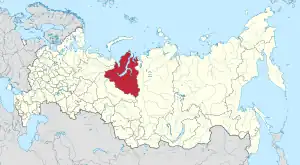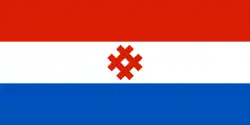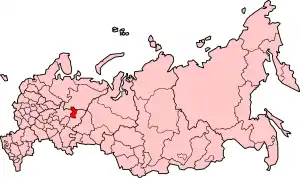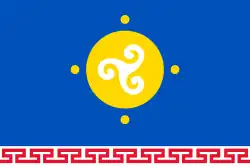| Autonomous okrug | |
|---|---|

| |
| Category | Federated state |
| Location | Russian Federation |
| Number | 4 |
| Populations | 42,090 (Nenets Autonomous Okrug) – 1,532,243 (Khanty-Mansi Autonomous Okrug) |
| Areas | 177,000 km2 (68,200 sq mi) (Nenets Autonomous Okrug) - 750,000 km2 (289,700 sq mi) (Yamalo-Nenets Autonomous Okrug) |
| Government |
|
| Subdivisions |
|
Autonomous okrugs (Russian: автономный округ, avtonomnyy okrug; more correctly referred to as "autonomous districts" or "autonomous areas") are a type of federal subject of the Russian Federation and simultaneously an administrative division type of some federal subjects. As of 2024, Russia has four autonomous okrugs of its 83 federal subjects.[lower-alpha 1] The Chukotka Autonomous Okrug is the only okrug which is not subordinate to an oblast. The other three are Arkhangelsk Oblast's Nenets Autonomous Okrug, Tyumen Oblast's Khanty-Mansi Autonomous Okrug, and Yamalo-Nenets Autonomous Okrug.
According to the constitution of the USSR, in case of a union republic voting on leaving the Soviet Union, autonomous republics, autonomous oblasts and autonomous okrugs had the right, by means of a referendum, to independently resolve whether they will stay in the USSR or leave with the seceding union republic, as well as to raise the issue of their state-legal status.[3]
History
Originally called national okrug, this type of administrative unit was created in the 1920s and widely implemented in the 1930s to provide autonomy to Indigenous peoples of the North, like the Karelian National Okrug for the Tver Karelians. The 1977 Soviet Constitution changed the term "national okrugs" to "autonomous okrugs" in order to emphasize that they were indeed autonomies and not simply another type of administrative and territorial division. While the 1977 Constitution stipulated that the autonomous okrugs were subordinated to the oblasts and krais, this clause was revised on December 15, 1990, when it was specified that autonomous okrugs were subordinated directly to the Russian SFSR, although they still could stay in the jurisdiction of a krai or an oblast to which they were subordinated before.
Current autonomous okrugs
| Flag | Map | Name |
Domestic names |
Capital |
Population (2010)[4] |
Area |
Formation |
|---|---|---|---|---|---|---|---|
 |
 |
Chukotka Autonomous Okrug |
Russian: Чукотский Автономный Округ (Chukotskiy Avtonomny Okrug) Chukot: Чукоткакэн Aвтономныкэн Округ (Chukotkaken Avtonomnyken Okrug) |
Anadyr Russian: Анадырь (Anadyr) Chukot: Кагыргын (Kagyrgyn) |
50,526 | 721,481 km2 (278,565 sq mi) | 1930-12-10 |
 |
 |
Khanty-Mansi Autonomous Okrug |
Russian: Ханты-Мансийский Автономный Округ (Khanty-Mansiyskiy Avtonomny Okrug) Khanty: Хӑнты-Мансийской Aвтономной Округ (Ȟănty-Mansijskoj Avtonomnoj Okrug) Mansi: Ханты-Мансийский Автономный Округ (Hanty-Mansijskij Avtonomnyj Okrug) |
Khanty-Mansiysk Russian: Ханты-Мансийск (Khanty-Mansiysk) Khanty: Ёмвоҷ (Yomvoḉ) Mansi: Абга (Abga) |
1,532,243 | 534,801 km2 (206,488 sq mi) | 1930-12-10 |
 |
 |
Nenets Autonomous Okrug |
Russian: Ненецкий Автономный Округ (Nenetskiy Avtonomny Okrug) Nenets: Ненёцие Aвтономной Ӈокрук (Nenjocije Awtonomnoj Ŋokruk) |
Naryan-Mar Russian: Нарьян-Мар (Naryan-Mar) Nenets: Няръянa Mарˮ (Nyar'yana Marq) |
42,090 | 176,810 km2 (68,267 sq mi) | 1929-07-15 |
 |
 |
Yamalo-Nenets Autonomous Okrug |
Russian: Ямало-Ненецкий Автономный Округ (Yamalo-Nenetskiy Avtonomny Okrug) Nenets: Ямалы-Ненёцие Aвтономной Ӈокрук (Yamaly-Nenyotsiye Avtonomnoj Ŋokruk) |
Salekhard Russian: Салехард (Salekhard) Nenets: Саляʼ Xарад (Salja’ Harad) |
522,904 | 769,250 km2 (297,009 sq mi) | 1930-12-10 |
Former autonomous okrugs
| Flag | Map | Name |
Domestic names |
Capital |
Population |
Area |
Years |
|---|---|---|---|---|---|---|---|
 |
 |
Agin-Buryat Autonomous Okrug |
Russian: Агинский Бурятский Автономный Округ (Aginskiy Buryatskiy Avtonomny Okrug) Buryat: Агын Буряадай Aвтономито Tойрог (Agyn Buryaaday Avtonomito Toyrog) |
Aginskoye Russian: Агинское (Aginskoye) Buryat: Ага (Aga) |
76,383 (2008) | 19,592 km2 (7,565 sq mi) | 1937–2008 |
 |
 |
Evenk Autonomous Okrug |
Russian: Эвенкийский Автономный Округ (Evenkiyskiy Avtonomny Okrug) Evenki: Эведы Автомоды Округ (Ēvēde Avtōmōde Okrug) |
Tura Russian: Тура (Tura) Evenki: Typy (Turu) |
16,979 (2007) | 763,197 km2 (294,672 sq mi) | 1930–2007 |
 |
 |
Komi-Permyak Autonomous Okrug |
Russian: Коми-Пермяцкий Автономный Округ (Komi-Permyatskiy Avtonomny Okrug) Komi-Permyak: Коми-Пермяцкöй Aвтономнöй Округ (Komi-Permjacköj Avtonomnöj Okrug) |
Kudymkar Russian: Кудымкар (Kudymkar) Komi-Permyak: Кудымкöр (Kudymkör) |
132,824 (2005) | 32,770 km2 (12,653 sq mi) | 1930–2005 |
 |
 |
Koryak Autonomous Okrug |
Russian: Корякский Автономный Округ (Koryakskiy Avtonomny Okrug) Koryak: Чав’чываокруг (Čav’čyvaokrug) |
Palana Russian: Палана (Palana) Koryak: Пылылъын (Pylylʺyn) |
22,580 (2007) | 292,600 km2 (112,973 sq mi) | 1930–2007 |
 |
 |
Taymyr Autonomous Okrug |
Russian: Таймырский Автономный Округ (Taymyrskiy Avtonomny Okrug) | Dudinka Russian: Дудинка (Dudinka) |
38,372 (2007) | 879,929 km2 (339,742 sq mi) | 1930–2007 |
 |
 |
Ust-Orda Buryat Autonomous Okrug |
Russian: Усть-Ордынский Бурятский Автономный Округ (Ust’-Ordynskiy Avtonomny Okrug) Buryat: Усть-Ордын Буряадай Aвтономито Tойрог (Ust’-Ordyn Buryaaday Avtonomito Toyrog) |
Ust-Ordynsky Russian: Усть-Ордынский (Ust-Ordynsky) Buryat: Ордын Адаг (Ordyn Adag) |
134,320 (2008) | 22,400 km2 (8,649 sq mi) | 1937–2008 |
Recent developments
In 1990, ten autonomous okrugs existed within the RSFSR. Between 2005 and 2008, the three autonomous okrugs in which the titular nationality constituted more than 30% of the population were abolished. Since then, three more have been abolished, leaving four. On 13 May 2020, the governors of Arkhangelsk Oblast and Nenets Autonomous Okrug announced their plan to merge following the collapse of oil prices stemming from the COVID-19 pandemic.[5][6] The process was subsequently scrapped on July 2 following public outcry to the merger.[7]
The ten autonomous okrugs in 1990 were:
| Entity in 1990 | Status in August 2008 |
|---|---|
| Agin-Buryat Autonomous Okrug | now Agin-Buryat Okrug of Zabaykalsky Krai |
| Chukotka Autonomous Okrug within Magadan Oblast | no longer subordinated to Magadan Oblast |
| Evenk Autonomous Okrug within Krasnoyarsk Krai | now Evenkiysky District of Krasnoyarsk Krai |
| Khanty–Mansi Autonomous Okrug within Tyumen Oblast | (no change) |
| Komi-Permyak Autonomous Okrug | now Komi-Permyak Okrug of Perm Krai |
| Koryak Autonomous Okrug within Kamchatka Oblast | now Koryak Okrug of Kamchatka Krai |
| Nenets Autonomous Okrug within Arkhangelsk Oblast | (no change) |
| Taymyr Autonomous Okrug within Krasnoyarsk Krai | now Taymyrsky Dolgano-Nenetsky District of Krasnoyarsk Krai |
| Ust-Orda Buryat Autonomous Okrug within Irkutsk Oblast | now Ust-Orda Buryat Okrug of Irkutsk Oblast |
| Yamalo-Nenets Autonomous Okrug within Tyumen Oblast | (no change) |
Ethnic composition of autonomous okrugs
The table below also includes autonomous okrugs which have since changed status.
| Autonomous Okrug | titular nation | Russians | other[8] | |||||||||
|---|---|---|---|---|---|---|---|---|---|---|---|---|
| year | 1979 | 1989 | 2002 | 2010 | 1979 | 1989 | 2002 | 2010 | 1979 | 1989 | 2002 | 2010 |
| Agin-Buryat Autonomous Okrug[9] | ▲52,2 | ▲ 54,9 | ▲ 62,5 | ▲ 65,1 | ▼42 | ▼ 40,8 | ▼ 35,1 | ▼ 32,5 | ||||
| Komi-Permyak Autonomous Okrug[9] | ▲61,6 | ▼ 60,2 | ▼ 59 | ▼34,9 | ▲ 36,1 | ▲ 38,1 | ||||||
| Koryak Autonomous Okrug (all Indigenous)[9] | 16,3 | ▲ 16,45 | ▲ 26,6 | ▲30,3 | 62,9 | ▼ 62 | ▼ 50,5 | ▼46,2 | 24,9 | ▲ 40,5 | ▲46,5 | |
| Nenets Autonomous Okrug (Komi) | ▼12,8 | ▼ 11,9 | ▲ 18,6 | ▲66 | ▼ 65,8 | ▼ 62,4 | ▲ 66,1 | ▼11,1 | ▼ 9,5 | ▲ 10,8 | ▼ 9 | |
| Taymyr Autonomous Okrug (Dolgan and Nenets)[9] | ▼9,6 | ▼ 8,9 | ▲ 13,8 | ▲ 15,7 | ▲68,9 | ▼ 67,1 | ▼ 58,6 | ▼ 50,0 | ▼5 | ▼ 4,4 | ▲ 7,6 | ▲ 10,1 |
| Ust-Orda Buryat Autonomous Okrug[9] | ▲34,1 | ▲ 36,3 | ▲ 39,6 | ▲39,8 | ▼58,3 | ▼ 56,5 | ▼ 54,4 | ▼ 54,2 | ||||
| Khanty–Mansi Autonomous Okrug | ▼1,9 | ▼ 0,9 | ▲ 1,2 | ▲ 1,3 | ▼74,3 | ▼ 66,3 | ▼ 66 | ▲ 68,1 | ▼1,1 | ▼ 0,5 | ▲ 0,7 | ▲ 0,8 |
| Chukotka Autonomous Okrug (all Indigenous) | ▼8,1 | ▼ 7,3 | ▲ 23,4 | ▲ 26,7 | ▼68,6 | ▼ 66,1 | ▼ 51,8 | ▲ 52,5 | 9,6 | ▲ 30,8 | ▲ 35,3 | |
| Evenk Autonomous Okrug[9] | ▼20 | ▼ 14,1 | ▲ 21,5 | ▲ 22,0 | ▲62,5 | ▲ 67,5 | ▼ 61,9 | ▼ 59,4 | ||||
| Yamalo-Nenets Autonomous Okrug (Nenets) | ▼10,7 | ▼ 4,2 | ▲ 5,2 | ▲ 5,9 | ▲59,1 | ▲ 59,2 | ▼ 58,8 | ▲ 61,7 | ▼1,5 | ▲ 1,7 | ▲ 1,9 | |
Notes
- ↑ If including the Russian-occupied territories of Ukraine, it would be 89 federal subjects.[1][2]
References
- ↑ Heaney, Dominic, ed. (2023). "The Government of the Russian Federation". The Territories of the Russian Federation 2023 (24th ed.). Abingdon: Routledge. pp. 43–51. ISBN 9781032469744.
Including the two territories in Crimea, the 85 territories comprise 22 republics, nine krais (provinces), 46 oblasts (regions), three cities of federal status (Moscow, St Petersburg and Sevastopol), one autonomous oblast and four autonomous okrugs.
- ↑ Dickson, Janice (September 30, 2022). "Putin signs documents to illegally annex four Ukrainian regions, in drastic escalation of Russia's war". The Globe and Mail. Archived from the original on October 1, 2022. Retrieved October 1, 2022.
Mr. Putin's claim to more than 15 per cent of Ukraine's territory is the largest annexation in Europe since the Second World War.
- ↑ "СОЮЗ СОВЕТСКИХ СОЦИАЛИСТИЧЕСКИХ РЕСПУБЛИК. ЗАКОН О порядке решения вопросов, связанных с выходом союзной республики из СССР" (in Russian). Archived from the original on September 12, 2016. Retrieved June 13, 2022.
- ↑ "2010 All-Russian Population Census" (PDF). All-Russian Population Census (in Russian). December 22, 2011. Retrieved May 12, 2019.
- ↑ Quinn, Eilís (May 14, 2020). ""Catastrophic" economic situation prompts merger talks for Nenets AO and Arkhangelsk Oblast". The Barents Observer. Retrieved May 15, 2020.
- ↑ "Russian Regions to Become Single Federal Subject in Decade-First". The Moscow Times. May 13, 2020. Retrieved May 15, 2020.
- ↑ Antonova, Elizaveta (July 2, 2020). "The head of the Nenets Autonomous District declared refusal to unite with the Arkhangelsk region". RBC (in Russian). Retrieved July 6, 2020.
- ↑ Are the people who are in parentheses next to the autonomous regions and the second-largest two-part Indigenous autonomous regions.
- 1 2 3 4 5 6 liquidated Autonomous okrug.